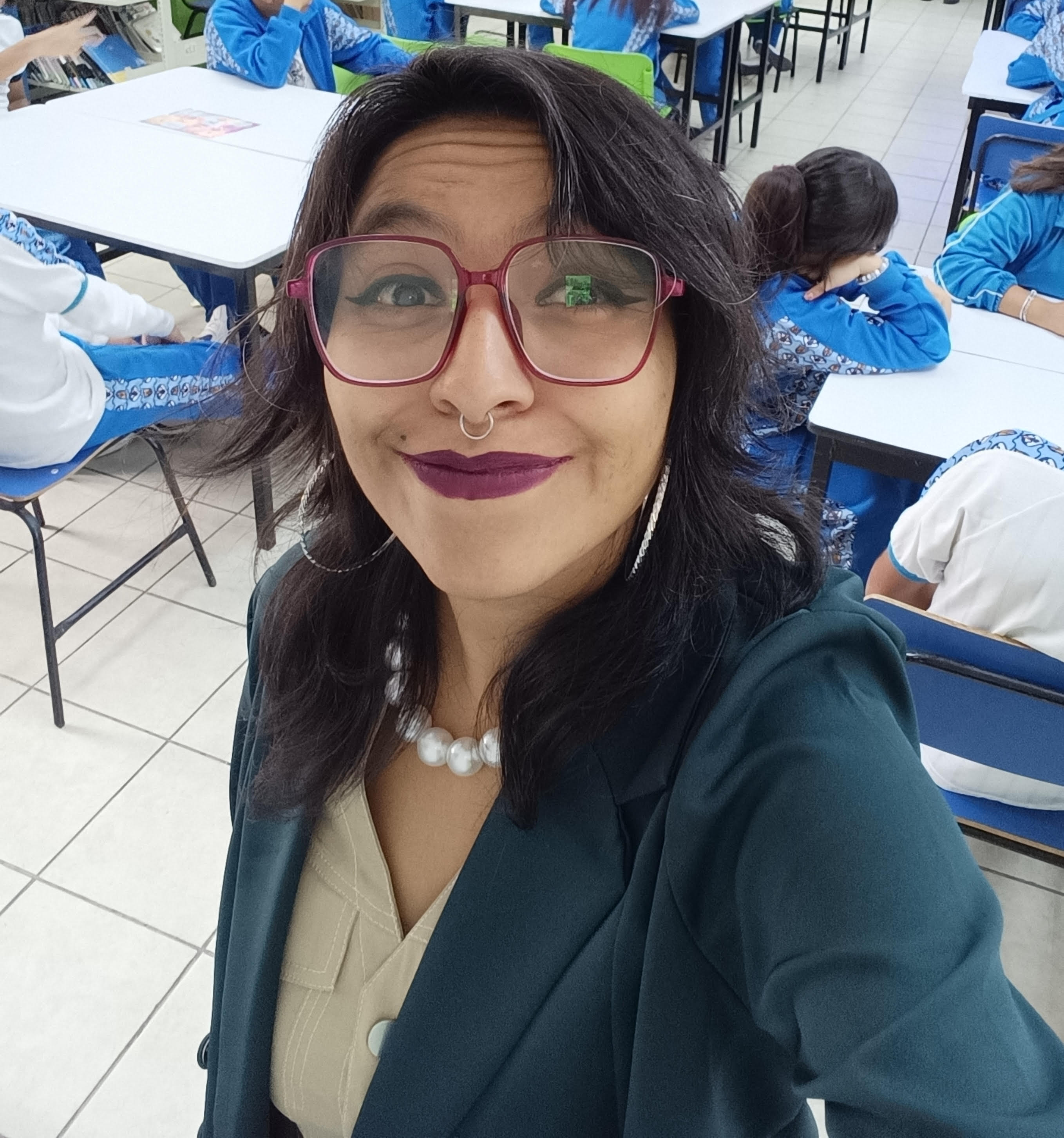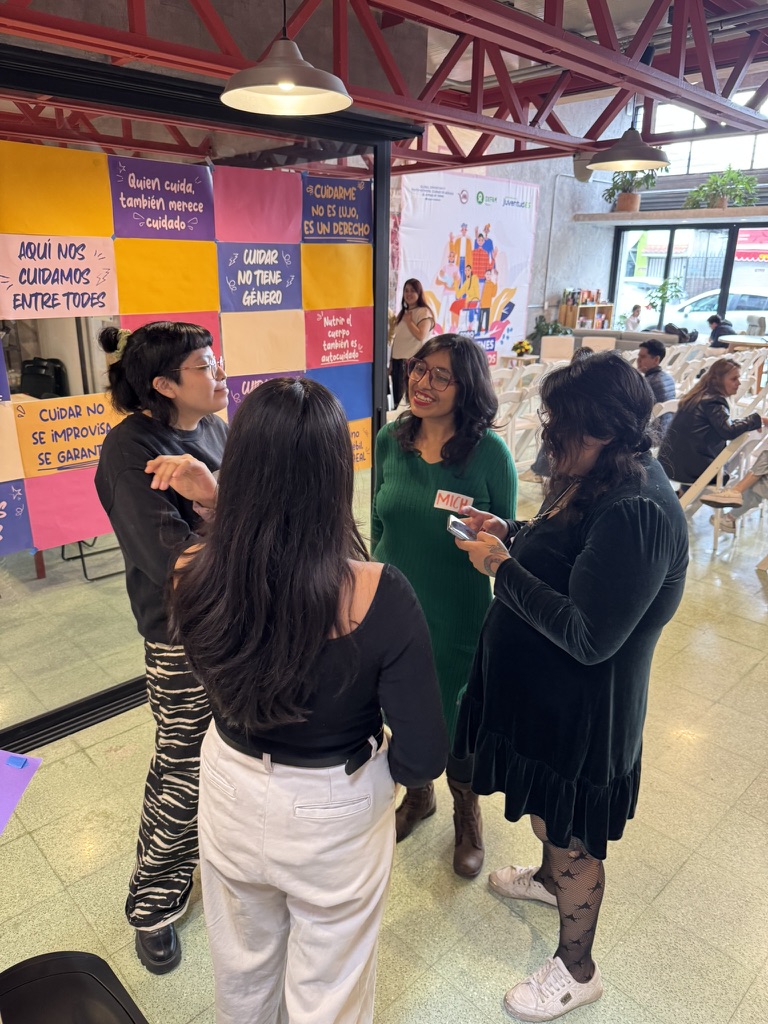By Perla Michelle Rosales Sandoval
GOYN CDMX Youth Advisory Group
Dedicated to Nora Angélica Sánchez Conde:
Without you, this family wouldn't exist. Thank you for giving me a sister.
On June 20, I had the opportunity to participate in the forum "Young Voices in Care," a collaborative effort between the Youth Platform, the GOYN CDMX network, the Citizen Initiative, and Oxfam Mexico.
I arrived with the first rays of sunlight to begin preparations, greet friends, and build new bonds.
As the partitions and registration desks were being installed, that "something big is about to happen" atmosphere was already in the air.
Throughout the day, I had one thought in mind: How does this issue impact my life? How does this affect me? The answer was crystal clear.
My family isn't a conventional family; we're not your typical traditional family. We're two lesbian women, a gay man, and three dogs who fill our daily lives with fur and tenderness. At home, like any other family, we take care of each other with cuddles, warm meals, awkward questions, and a whole lot of patience. We're there for each other when we're sick, when money's tight, and even when we're tired of trying to be strong all the time.
Our family exists, it endures, and, like all diverse families in Mexico City, it deserves to be recognized in public policies from its very construction.
In Mexico, women spend 37.9 hours per week on domestic work and caregiving, while men spend 25.6 hours. This invisible burden contributes 24.7% of GDP—value in time and effort that is rarely rewarded.
Because the face of care is feminine, but it is also queer.
Lesbian grandmothers caring for their grandchildren, gay uncles raising their nephews, muxe women caring for their mothers, or shared houses among friends where caregiving is organized without surnames or contracts: all these forms of care exist. They aren't included in the statistics, but they are present in everyday life. They sustain it and also deserve recognition.
LGBTQ+ people are 1.2 times more likely to be primary caregivers and 3.5 times more likely to care for friends or our “chosen family.”
With this in mind, I spoke up and brought otherness to the table. I questioned how we can include these chosen families in the public care system:
Is it really possible?
Can we imagine a reality where friends who live together and are a family share access to social security?
It might sound crazy and perhaps unattainable, but the truth is that being able to consider this reality would help reduce the caregiving burden for those of us who care for our families from a diverse perspective.
Because young people are not only subjects of care, we are also caregivers and sustain the reality that surrounds us.
LGBTQ+ caregivers tend to be younger, ethnically diverse, and have fewer financial resources than non-LGBTQ+ caregivers: for example, 52% of LGBTQ+ caregivers reported financial hardship, compared to 38% of non-LGBTQ+ caregivers.
During the forum, the Youth Care Agenda was presented and signed, a twelve-point document summarizing the demands we, as young people, put on the table:
-
Recognize the right to care for young people and the specific rights of caregivers, with an intersectional and anti-discrimination approach.
-
Ensure youth participation in the design, implementation, and evaluation of the Mexico City Public Health Care System.
-
Make visible diverse forms of care beyond the traditional model—including LGBTIQ+ networks, youth communities, and chosen families.
-
Promote cultural campaigns that transform the narrative of care, highlight co-responsibility, and call for new masculinities.
-
Professionalize and compensate the care work that many young women and their families currently perform without pay.
-
Promote pedagogies of care and partnerships with schools, businesses, and communities to build shared responsibility.
-
Guarantee decent, violence-free jobs for domestic and care workers.
-
Prevent and address the violence and discrimination experienced by young caregivers.
-
Ensure leave, flexible hours, and free services that distribute the burden of care.
-
Allocate a targeted and sufficient budget, with accountability mechanisms.
-
Generate disaggregated data and indicators that measure youth care and its impact.
-
Establish the foundations for a comprehensive metropolitan care system that operates across the Metropolitan Area of the Valley of Mexico.
Thanks to the intervention of various representatives of the Mexico City Government, we understood that this agenda is not only ours: it is also theirs.
And we're already well on our way: as a team, in utopias, in youth villages, and in many other organizations, we want to recognize, reduce, redistribute, reward, and represent the otherness that cares:
To queer youth, to young single parents, to granddaughters caring for their grandparents who are not blood relatives, but are related by life.






